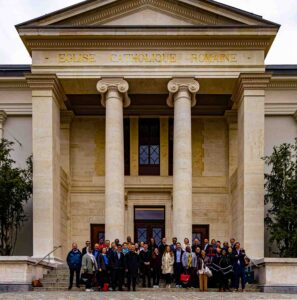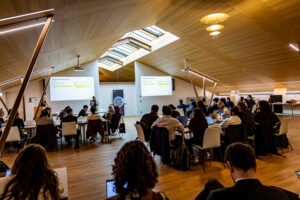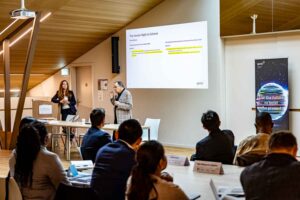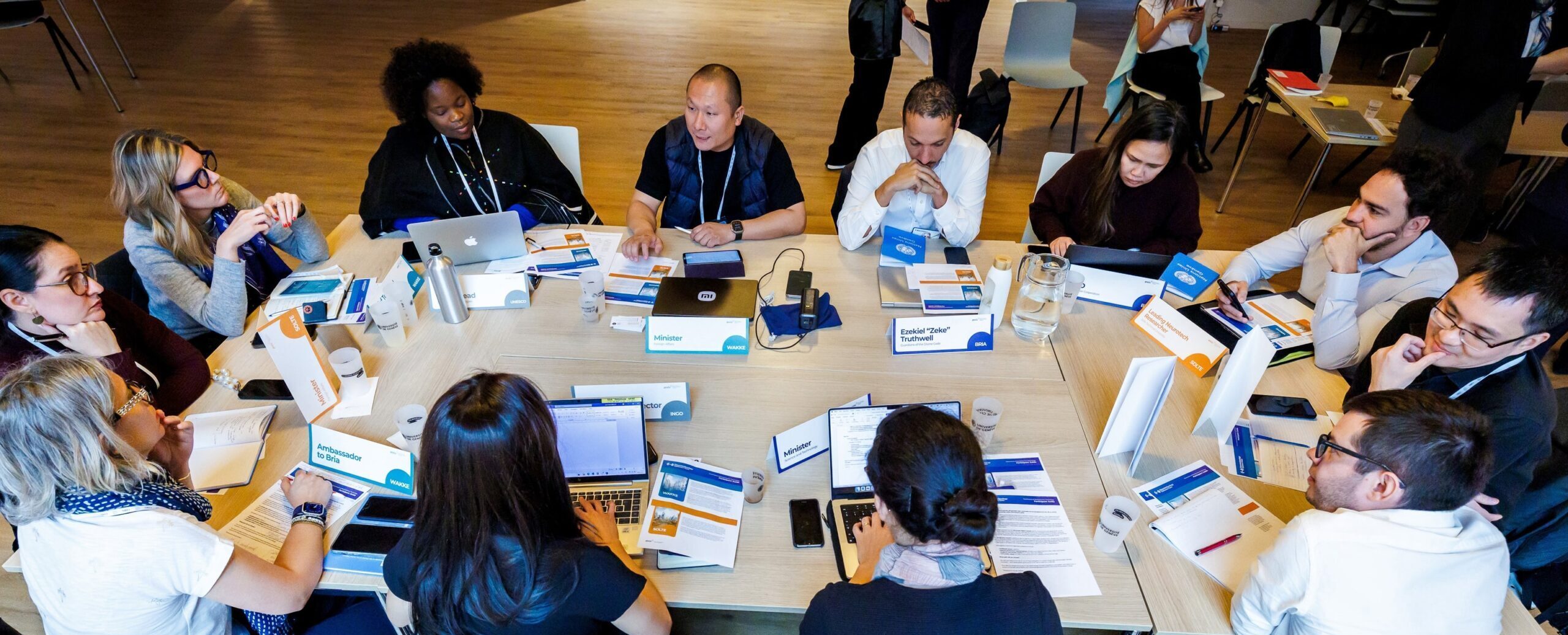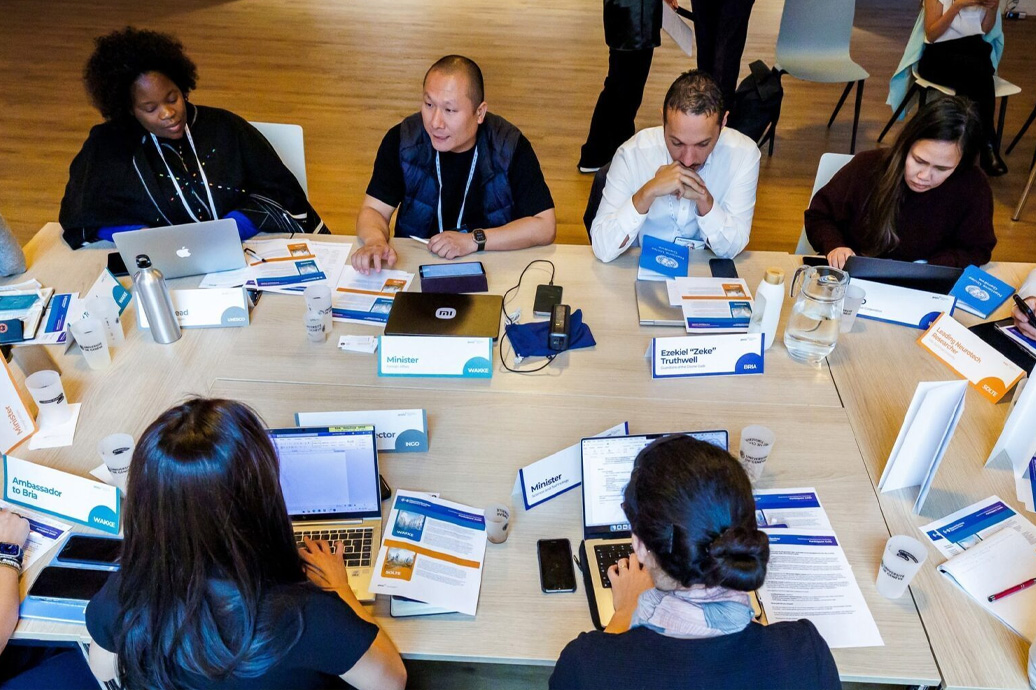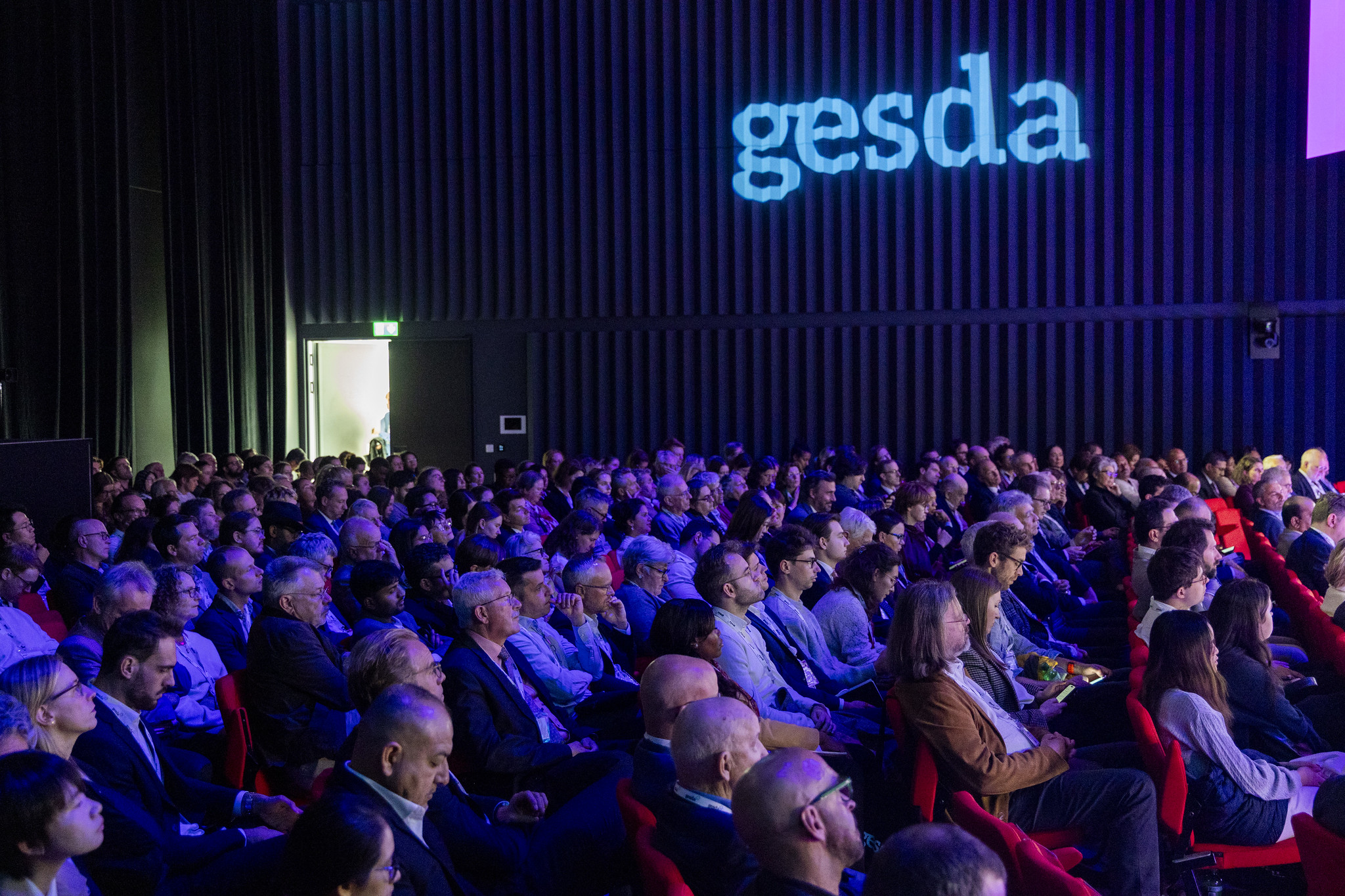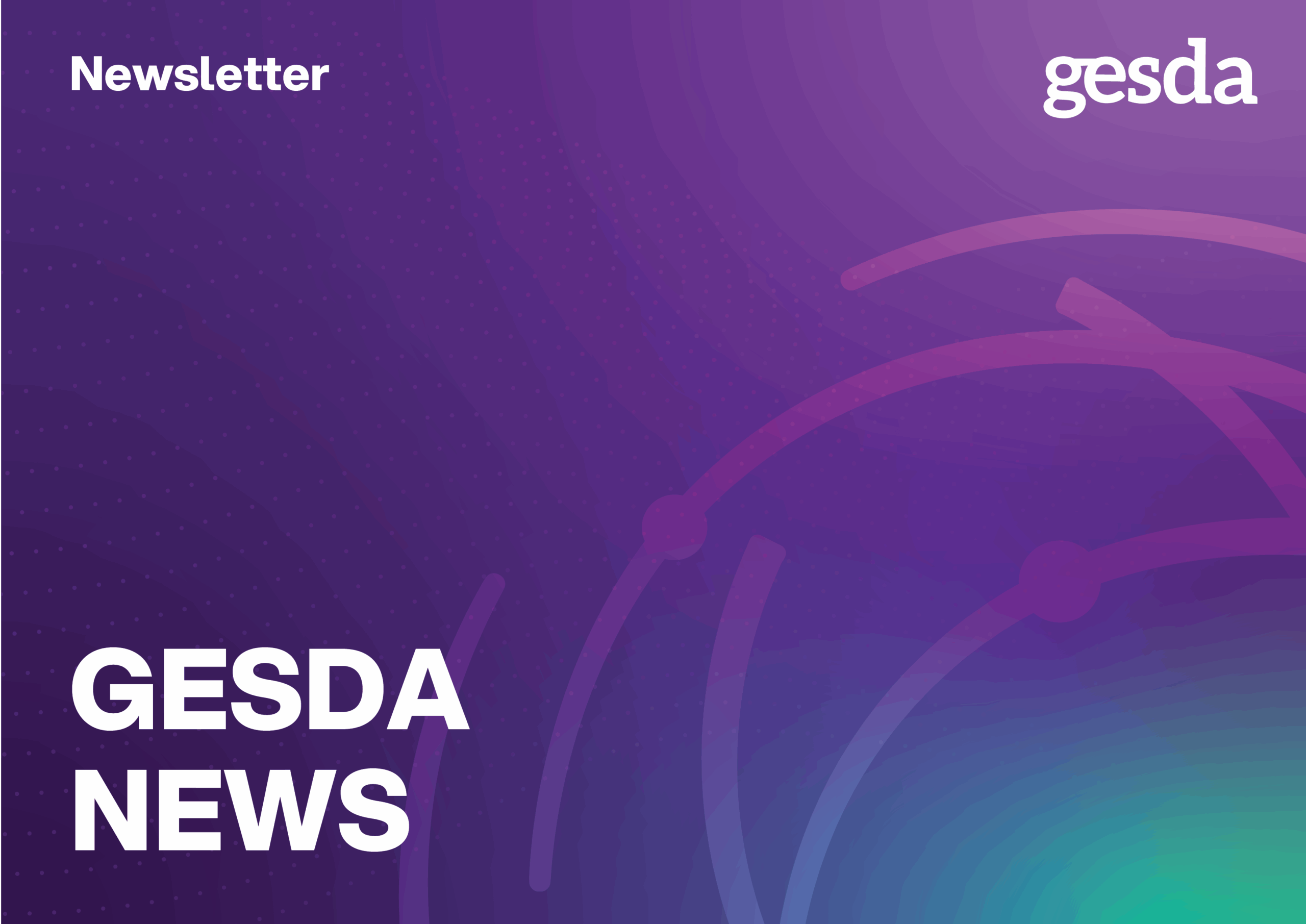Focus shifted to the future governance of neurotechnology, computational diplomacy, and GESDA’s AI-augmented intelligence tool for decision-makers.
Inside the wood-paneled meeting room of a newly renovated Geneva church, the cohort began the day focused on the concept that everyone has a right to benefit from scientific progress. The foundation for the human right to science is embedded in the UN’s 1948 Universal Declaration of Human Rights, 1966 International Covenant on Economic, Social and Cultural Rights, and several other treaties. “It’s really a serious foundation for science diplomacy,” said GESDA Senior Advisor Gérard Escher. “It’s an anticipatory right. Future generations are stakeholders of this right. So you have to build initiatives or actions today ensuring that future generations will be able to benefit from science.”
Story by John Heilprin | Photos by Marc Bader/GESDA
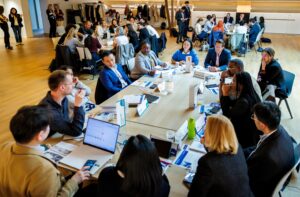
A reclusive tech billionaire, a group that calls itself the Guardians of the Divine Code, and a web of competing interests that includes multilateral institutions, national delegations, academics and industry leaders.
The Neurotechnology Diplomacy game created an experiential learning simulation about navigating the fallout from a major ransomware attack on brain implants. As they role played, some participants argued to ensure that everyone should have access to the benefits of scientific advances and technology. Others pushed to preserve the rights of nations to advances their own interests and of companies to innovate. Heated arguments – simulated – broke out over accusations of “brain hacking” and stern reminders “this is diplomacy not activism” and that “if you don’t calm down, we might need to call security.”
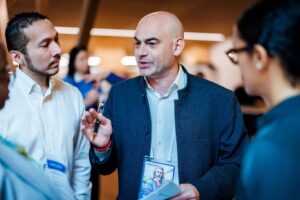 Some pointed to the importance of being prepared for anything, others said the best resolutions are the result of negotiations that involve compromise and some degree of dissatifaction on all sides.
Some pointed to the importance of being prepared for anything, others said the best resolutions are the result of negotiations that involve compromise and some degree of dissatifaction on all sides.
Nouf Alhameli, Science and Technology Advisor for the United Arab Emirates’ Ministry of Foreign Affairs, said “the idea of having new topics like emerging technologies in the area of human rights means you have people defining language that has never been defined. There are also new alliances that emerge and they inform language.”
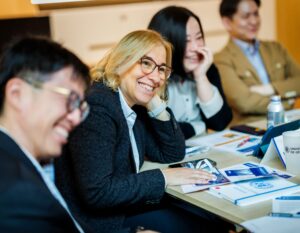
A distinct element of Geneva Science Diplomacy Week is the combination of fictional scenarios with exposure to real-world science diplomacy cases. Following the simulation game, participants had the unique opportunity to hear from four diplomats from Chile, Greece, Singapore and Switzerland who led a draft resolution on neurotechnologies at the UN Human Rights Council in Geneva that was adopted by consensus just a few weeks ago.
GESDA introduced the Anticipation Observatory, a work in progress. GESDA is working with global partners on delivering by 2026 an expert-curated, AI-augmented intelligence tool on expected scientific trends and their implications for diplomacy, business and society for all topics in GESDA’s Science Breakthrough Radar®. The Anticipation Observatory is part of GESDA’s Anticipation Gateway Initiative to democratize the early understanding and uses of emerging science.
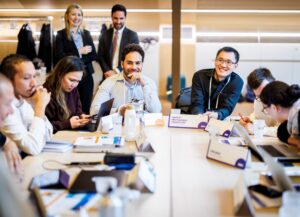 A session on computational diplomacy featured two associate professors, Roland Bouffanais and Didier Wernli, and senior researcher Stéphan Davidshofer at the University of Geneva, or UNIGE, and its Lab for Science in Diplomacy (SiDLab). They discussed how a systematic method of inquiry based on computational science can bolster science diplomacy by quantitatively analyzing, studying, and understanding critical mechanisms underpinning foreign policy and international relations.
A session on computational diplomacy featured two associate professors, Roland Bouffanais and Didier Wernli, and senior researcher Stéphan Davidshofer at the University of Geneva, or UNIGE, and its Lab for Science in Diplomacy (SiDLab). They discussed how a systematic method of inquiry based on computational science can bolster science diplomacy by quantitatively analyzing, studying, and understanding critical mechanisms underpinning foreign policy and international relations.
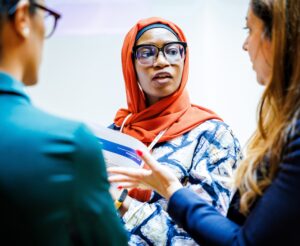
“First you need to get acquainted with your data and reduce the amount of data,” Bouffanais said. “Very important is the data storytelling, because if you have the data and you’re not able to tell a story you’re not going to be able to change the minds of policymakers.”
The cohort broke into groups to discuss the results from SiDLab’s work of crunching data on resolutions adopted by the United Nations Security Council, the most powerful arm of the world body because it can take legally binding action. The research has shifted focus from specific case studies toward detecting patterns, said Wernli. For example: “There are a lot of people saying the multilateral system is ineffective, but actually a lot of things work,” he said.
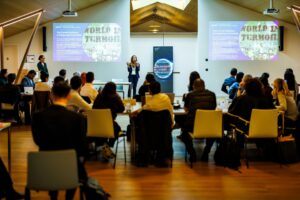
Each of the groups examined potential uses for the data and implications of the language involved by debating a specific theme around UN resolutions during the half-century from 1967 to 2017 about North Korea’s nuclear program, HIV-AIDS, women, peace and security, Iraq-Kuwait, and Arab-Israeli conflict.
“Citation analysis is something I think most of us would like to see to help determine the relevance of the resolutions,” said Antonio Pires, a postdoctoral researcher at the University of São Paulo, Brazil, adding it could be helpful to have more analysis of “the differences between vetoed and successful resolutions.”
Marga Gual Soler, Head of Science Diplomacy Capacity Building for GESDA, said GESDA’s simulation games are designed to bridge mindsets, connecting scientists, diplomats, business leaders, and citizens through experiential learning.
“In our neurotechnology diplomacy exercise, participants stepped into roles far beyond their daily realities, embodying stakeholders with divergent values, motivations, and even world views,” she said. “Many were surprised by how deeply they connected with their characters, from negotiating trade-offs in high-stakes governance to experiencing the frustration of being unheard, even as a fictional conspiracy theorist. The game unlocked creative expression, challenged assumptions, and provided a safe space to test policy ideas, build empathy, and rehearse the future.”
Photos By Michael Chiribau/UNITAR
